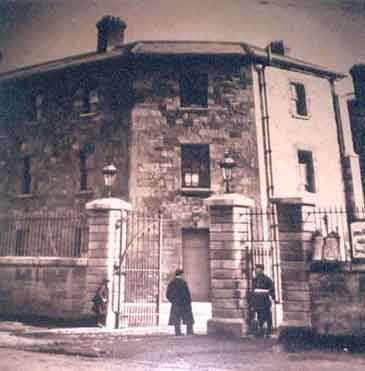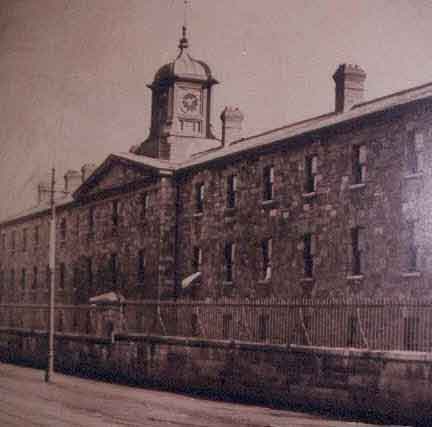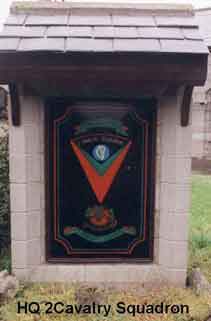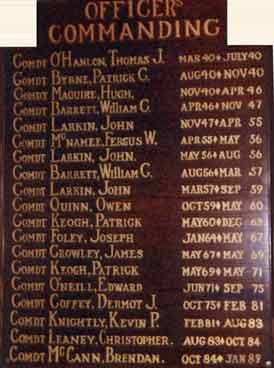by Comdt Oliver Barbour.
2Cavalry Squadron History ![]()
by Comdt
Oliver Barbour.
The Unit Motto "First in
last out"

Officers Commanding
Bug Chasers
The war years
Presidential Escort of Honour
Display Teams
Niemba and The Military Medal for Gallantry
Deployment in Cyprus
Border Duties
Shooting Teams and sport
Back to Cathal Brugha
Comdt Hugh Maguire
Motorcycles
Wellington Barracks (Griffith Bks)
1. HISTORY:
During the early 1930's the forerunner of the Unit of today was a
Volunteer Unit with a Regular
Cadre. The Volunteer Reserve, from 1934 on, consisted of Nineteen Cyclist
Squadrons and Six (6) Horse Squadrons.
2 Horse Squadron was NOT equipped as
one might expect, but instead depended on the iron horse, the bicycle. With
full- scale mobilisation of the Army at the beginning of World War II,
2 Horse Squadron was disbanded in May 1939. Most of its personnel, the volunteer
Unit and
11 Cyclist Squadron formed the members of 2 Motor Squadron. The establishment of
the Unit took place officially on 13 June 1940 in
accordance with the provisions of DFR C54 Part I
( Organisation of the Defence Forces). However, the Unit was in existence  from
the summer of 1939.
from
the summer of 1939.
The Squadron, along with others formed at the time, was a new type of Cavalry Unit, part of a Brigade, and used operationally for reconnaissance. 2 Motor Squadron was part of 2 Brigade and was to be concentrated at McKee Barracks, Dublin. However, it was NOT until much later that the Unit would serve there.
Comdt MICHAEL KILKELLY was
appointed the first Commanding Officer of the 'Regular' 2 Motor Squadron.
In
1939 the Unit was equipped with light Ford's known as 'Bug Chaser and
BSA M20 Motorcycles, but later an Armoured Troop of FORD Armoured
Cars, manufactured in CARLOW
was added. Initially stationed in MULLINGAR the Unit soon moved to COLLINS
Barracks, DUBLIN.
In September 1940, the Squadron moved to CABRA CASTLE, KINGSCOURT, CO
CAVAN as part of the Army's overall defensive strategy. The Unit was soon up to
its full strength of 170 all ranks. Top
In 1941 the Unit was moved back to DUBLIN
and was stationed in the MONASTERY, CLONDALKIN, and later at BALLSBRIDGE in the
RDS Grounds. During the war years training and operational work progressed
vigorously.
The Unit became proficient in reconnaissance, patrolling,
setting up road blocks, raiding, river
crossing, cordoning and explosive laying. 2 Motor Squadron was the forward
reconnaissance element of 2 Division which had a
NORTHERN defence line
across the BOYNE River. In the event of an
attack the border from NORTHERN IRELAND, the task
of the Unit was to delay and
harass the
attacking forces as long as possible. Constant patrolling was the order of the
day, from DUNDALK
to BALLYBAY. In the event of a breakthrough the secondary task of the Unit was
to operate
independently behind the lines to disrupt the enemy's rear. They would therefore
operate as a guerrilla
force similar to
the 'Flying Columns' of the War of independence. A measure of
the tactical prowess of
Unit personnel can be gauged
from the Units first position in an All Army
Administration and Tactics Competition of ~ 944. In 1945 the
Unit moved to
GRIFFITH Barracks for the first time. Top
In 1955 2 Motor Squadron was tasked with providing the
PRESIDENTIAL ESCORT OF HONOUR -
hitherto held
by 4 Motor Squadron, then
based in PLUNKETT Barracks. This involved escorting An tUachtaran, Foreign Heads
of State and Ambassadors accredited to Ireland. The tradition of motorcycling can be traced back to the
beginning of the 'Emergency' when Unit personnel took part in the First Motor Cyclists Course
under Comdt STANLEY WOODS, the world famous racing motorcyclist.
The BSA
M20 ------ Triumph single saddle
-----and double saddle, ----SANGLAS-
---kick start and self start, ---YAMAHA XS 500
-----
Kawasaki GT550cc -----were all used through the years up to the present day
---Honda 650cc.-
Top
![]()
The tradition of motorcycling excellence
continued with the Display Teams of the 1940's,
50's, and 60's. Up to the 1960's
the members of the Teams were mainly drawn from 2 Motor Squadron and 1 Motor
Squadron. The skill of the riders brought wide acclaim to the Cavalry Corps and
their Units. With its involvement in operational, display and
ceremonial riding over the last few decades, the Squadron has built up a proud
tradition in this unique area.Top

The 1960's saw 2 Motor Squadron personnel serve with
distinction in ONUC in the former
BELGIAN CONGO. At the NIEMBA Ambush of 08 November 1960, Sgt HUGH GAYNOR, Tpr
THOMAS FENNELL and Tpr ANTHONY BROWNE lost their lives. Tpr BROWNE was later
posthumously awarded the Military Medal for Gallantry -with the following
citation: "HE HAD A REASONABLE OPPORTUNITY OF ESCAPING BECAUSE HE WAS NOT
WOUNDED BUT CHOSE TO REMAIN WITH AN INJURED COMRADE". Top
By 1964 the heat was going out
of the CONGO situation with the temperature rising in CYPRUS because of the
GREEK/TURKISH confrontation.
Many Squadron personnel served in CYPRUS with
UNFICYP where sixteen Panhard AML 60's were first deployed.
The Unit continues the
tradition of overseas service today in UNIFIL with personnel also having served
in SOMALIA, RWANDA and again in CYPRUS. Top
During the 1960's and 1970's the Unit
was located in CATHAL BRUGHA Barracks
and was situated there when the NORTHERN IRELAND
troubles escalated in 1969.
Eight (8) of the sixteen AML 60's deployed in CYPRUS
![]() -were returned home and distributed
between the home Units. A Troop from 2 Motor Squadron moved to CAVAN for a time,
then to CASTLEBLAYNEY and DUNDALK and
remained there actively involved on Border operations from 1972 to 1984. Top
-were returned home and distributed
between the home Units. A Troop from 2 Motor Squadron moved to CAVAN for a time,
then to CASTLEBLAYNEY and DUNDALK and
remained there actively involved on Border operations from 1972 to 1984. Top
In 1975
the Squadron moved
to GRIFFITH Barracks
for the second time.
In doing so it became the first
regular Unit to occupy the barracks since 1959. The responsibilities of the
Squadron
included administering the barracks in addition to its operational and
ceremonial tasks In 1983 the title of the Unit was changed from 2 Motor
Squadron to
2 Cavalry Squadron. Top
![]()
The traditional routine of
the Squadron has NOT altered much over the last
decade. The early months
of the year are spent in weapon training
and in preparation for Shooting
Competitions both at Brigade and Command level.
The unit has consistently
performed well in competition over the years with regular success in Brigade, Command and All Army Shoots.
THE UNIT WAS
THE HOLDER OF THE
ALL ARMY SNIPER TEAM TROPHY FOR 1992.
In 1993 the unit was R/Up in the E Comd
Falling Plates competition. In 1994 the Unit won the E Comd Section In Attack
competition. In 1995 the Unit won the Bde Dagger Competition. When small arms
training schedules have been
completed the Unit turns to crew training on Armoured Cars in Gunnery, Driving and Radio procedure and
tactical exercises. In recent years operations in aid to civil power have
accounted mostly for the employment of 2 Cavalry Squadron personnel.
These
operations range from Court Guards to Cash In Transit Escorts. Much of Unit
training is directed to
preparing troops for this role. Demonstrations, lectures
and seminars are set up regularly to ensure that the highest
standards are met
and continued. Operations such as these give great scope to young officers and
NCOs to enhance their leadership and command skills given that tasks cover the
length and breath of the country in all weather conditions.
The members of the Unit have always displayed a keen
interest in sport, soccer and volleyball being
the most
popular over the years. A perpetual Trophy for Seven-a-Side soccer was
instigated to the memory of Trooper
COLM KEENAN (RIP) who died of a heart attack
while on morning PT in February 1987. Tpr
MARK KAVANAGH was captain of the Bde
football team which won the 1995 Comd Championship.
In 1995 2 Cavalry Squadron won the
Cavalry Cup (Soccer) for the first time, and retained the Cup in 1996, and
also
the E Comd Cross Country Championships. During 1996 2 Cavalry Squadron has won the following prizes :
E Comd Javelin winner, E Comd 200 metres
winner, E Comd 4x100 relay winners, All Army 200 metres winner
(Tpr MARK
CORCORAN). In Badminton Winners of All Army
Novice Individual, All Army Runners Up in Novice Doubles and the ladies Singles
Runner Up. Top

On 15 September 1988 the Squadron made the short journey
across the Grand Canal to CATHAL BRUGHA Barracks to the amazement of the civilian populace along the way.
2 Cavalry Squadron and 11 Cavalry Squadron
(FCA)
were formally welcomed by 2 Infantry Battalion who saluted the Drive Past from
the Main Square. There is little doubt that the move back to CATHAL BRUGHA Barracks has been a positive one for the
Unit. The drain on resources of administering and securing GRIFFITH Barracks has
been removed. The friendly rivalry between the
Squadron and the Battalion is a
positive influence and is especially keen during the Shooting Season.
Top
2 Cavalry Squadron is a Unit which takes pride in its achievements and is
highly professional both operationally and ceremonially. This tradition of
excellence has been nurtured since the Unit was formed in 1939.
Our motto of "First In, Last Out" will, we feel always prevail in 2
Cavalry Squadron.
There will be room too for
the unofficial motto "Never
mind yer
man; How's the bike?" for as long as the Squadron exists.
Top
Comdt HUGH MAGUIRE
![]() - 21 Oct 1896-12 Mar 1997 2 Cavalry
Squadron turned out in full to honour one (1) of our founder officers on the 14 Mar
1997. He must have been just about the last surviving founder members of both
the volunteers and the Free State Army. When the Free State Army was formed HUGH was commissioned into it, as a young Lieutenant a couple of
years later he was in
charge of EAMON De VALERA in ARBOUR HILL
prison and typically befriended him,
even teaching
him to play chess. HUGH retired to the army reserve of officers
in 1929, which
entailed a yearly three (3)
week stint on regular service until at the outbreak of the Second World War in
1939 he was recalled for frill duty
with the army. On returning to active service in
1939 HUGH was detailed to form a motorised unit, which was to become the 2 Motor Squadron and which was later
re-named the 2 Cavalry Squadron.
- 21 Oct 1896-12 Mar 1997 2 Cavalry
Squadron turned out in full to honour one (1) of our founder officers on the 14 Mar
1997. He must have been just about the last surviving founder members of both
the volunteers and the Free State Army. When the Free State Army was formed HUGH was commissioned into it, as a young Lieutenant a couple of
years later he was in
charge of EAMON De VALERA in ARBOUR HILL
prison and typically befriended him,
even teaching
him to play chess. HUGH retired to the army reserve of officers
in 1929, which
entailed a yearly three (3)
week stint on regular service until at the outbreak of the Second World War in
1939 he was recalled for frill duty
with the army. On returning to active service in
1939 HUGH was detailed to form a motorised unit, which was to become the 2 Motor Squadron and which was later
re-named the 2 Cavalry Squadron.
He hand picked his men on the basis of general character, mechanical knowledge
and aptitude,
and was thus able to build up a magnificent Esprit de Corps in the unit.
The 2 Motor Squadron under HUGH, was inspected by the then
Taoiseach, and former ARBOUR HILL prisoner,
EAMON DeVALERA, in CAHIR PARK,
TIPPERARY, in 1942. The occasion was major
army manoeuvres.
In 1944, in an all-army competition, when all aspects of
military life and field operations were ascertained and examined, Comdt HUGH'S 2
Motor Squadron was placed in first place. Later
that year at a march past at BALLSBRIDGE SHOW GROUNDS, the unit was presented
with a trophy
by the then Minister for Defence, the ate OSCAR TRAYNOR, on its magnificent
achievement.
Top
As a
matter of interest, the 2 Motor Squadron was a self contained unit, with
field-kitchens, cooks,
ambulance, doctor, red cross unit, petrol and oil tankers, 80 motor cyclists, 20
run-about light trucks
and four armoured cars. HUGH left the army in 1946, and retired from the reserve
in 1951. As a gesture of loyalty and appreciation towards the end of his active
service in the army his fellow officers wanted to make a presentation to him. He
declined the offer and
said to them that if they insisted a leather medal
would suit him fine. At his retiring function HUGH was presented with a handsome
medal, crafted in
leather, with the corps red, black, green insignia emblazoned on it. Old memories were exchanged one (1) afternoon
in 1972 in ARAS
an UACHTARAN between President De VALERA and his former captor. On 25 June
1995, HUGH was again received in the ARAS, in connection with his association
with
the 2 Cavalry Squadron. On the occasion of his "100th birthday",
officer NCOs and Troopers of 2 Cavalry Squadron arrived at his home in GLASNEVIN
bearing a
specially commissioned birthday cake and invited him to a re-union of past and
present officers at the
unit HQ in CATHAL BRUGHA BKS, on 25 Oct 1996. There were twelve former officers commanding
at the function. On display for the occasion were memorabilia, photos, archive
films and the Sliabh Na mBan"
![]() -armoured car. The formal greeting preceding the lunch in
the Officers Mess was given
by our youngest officer 2/Lt MICHAEL CONNEELY, who also was in command of the
firing party at
Hugh's
funeral. I would like to
quote from Fr PAT BRADY, from BALLYJAMESDUFF,
who paid a
beautiful tribute
to HUGH on his 100th birthday. "Through his long life he
saw many changes his father
became the proud owner of his own farm.
-armoured car. The formal greeting preceding the lunch in
the Officers Mess was given
by our youngest officer 2/Lt MICHAEL CONNEELY, who also was in command of the
firing party at
Hugh's
funeral. I would like to
quote from Fr PAT BRADY, from BALLYJAMESDUFF,
who paid a
beautiful tribute
to HUGH on his 100th birthday. "Through his long life he
saw many changes his father
became the proud owner of his own farm.
He saw a freed independent IRELAND, her soldiers going
off NOT to fight other peoples wars,
but to keep World peace. He lived to see our Statesmen and Women take their
place on the world stage. He saw his dream and PADHRAIG PEARSE'S dream come true. More importantly he
helped to make it come through.
He helped to make IRELAND a better place. He made a
difference".
One could say he has left behind exceptional memories to be cherished.
Top
| Comdt. O'Hanlon. Thomas | Mar 40 - Jul 40 |
| Comdt. Byrne.Patrick.C. | Aug 40 - Nov 40 |
| Comdt. Maguire. Hugh | Nov 40 - Apr 46 |
| Comdt. Barrett. William.C. | Apr 46 - Nov 47 |
| Comdt. Larkin. John. | Nov 47 - Apr 55 |
| Comdt. McNamee.Fergus.W. | Apr 55 - May 56 |
| Comdt. Larkin. John. | May 56 - Aug 56 |
| Comdt.Barrett. William.C. | Aug 56 - Mar 57 |
| Comdt.Larkin. John. | Mar 57 - Sep 59 |
| Comdt. Quinn. Owen. | Oct 59 - May 60 |
| Comdt. Keogh. Patrick. | May 60 - Dec 63 |
| Comdt. Foley. Joseph. | Jan 64 - May 67 |
| Comdt. Crowley. James. | May 67 - May 69 |
| Comdt. Keogh. Patrick. | May 69 - May 71 |
| Comdt. O'Neill. Edward. | Jun 71 - Sep 75 |
| Comdt. Coffey.Dermot.J. | Oct 75 - Feb 81 |
| Comdt. Knightly.Kevin.P. | Feb 81 - Aug 83 |
| Comdt. Leaney.Christopher. | Aug 83 - Oct 84 |
| Comdt. Mc Cann.Brendan. | Oct 84 - Jan 89 |
| Comdt. O'Brien. Patrick. | Jan 89 - Oct 89 |
| Comdt. Hynes.J.M. | Nov 89 - Mar 90 |
| Comdt. Campbell. William. | Mar 90 - May 93 |
| Comdt. Kerton.G.M. | May 93 - Jan 95 |
| Comdt. Barbour.O. | Feb 95 - Jul 98 |
| Comdt. Cooney.J.G | Jul 98 - Oct 99 |
| Comdt. Barbour.O. | Oct 99 - May 00 |
| Comdt. Cooney.J.G | May 00 - Jan 01 |
| Capt. Nugent.D. | Jan 01- May 01 |
| Capt. Rochford.P | Jun 01-Aug 01 |
| Comdt. Heskin.T | Aug 01 |